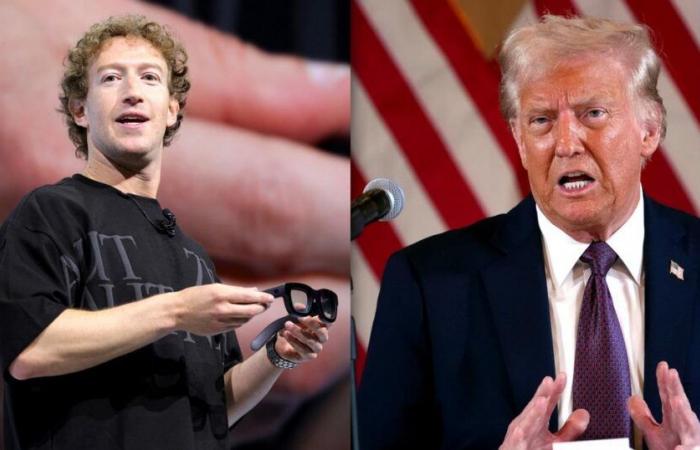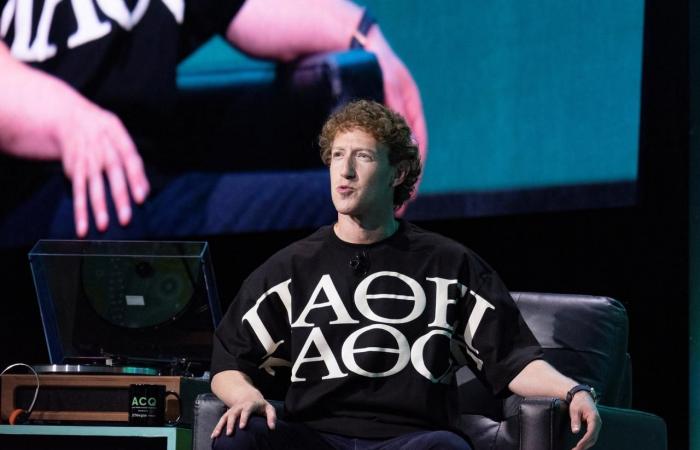Long seen as a symbol of Silicon Valley progressivism, Mark Zuckerberg seems to be embarking on an unexpected ideological shift. Between criticism of censorship, refocusing on freedom of expression and proximity to Donald Trump, the boss of Meta is redefining his political positioning, sparking questions and controversies.
Since his early days at the helm of Facebook, Mark Zuckerberg has presented his platforms as tools for the democratization of information, repeatedly reaffirming his commitment to freedom of expression. But recent years have been characterized by a rise in tensions, particularly around the management of fake news and criticism aimed at social networks in their perceived role as “arbiters of truth”.
In a surprise video published on Tuesday, January 7, the American multibillionaire announced an important change: the end of the fact-checking program (or fact checks, in French) and its replacement by a system of community notes, inspired by the model of X (ex-Twitter).
External content
This external content cannot be displayed because it may collect personal data. To view this content you must authorize the category Social networks.
Accept More info
According to Mark Zuckerberg, “auditors have been too politically oriented and have done more to reduce trust than to improve it, particularly in the United States.”
>> Read again about this for more details: Meta abandons its fact-checking program
During a long interview given Friday to The Joe Rogan Experiencea famous rather conservative American podcast, Mark Zuckerberg clarified his thoughts. According to him, it is important to return to the group’s original mission, which is to “give people the power to share and make the world more connected.”
According to him, the last ten years have been marked by pressure to implement censorship based on ideology. “I think two main events really triggered this. In 2016 there was the election of President Trump, which also coincided with Brexit in the EU. And in 2020 it was Covid. I think it was during these two events that we faced massive institutional pressure to start censoring content for ideological reasons,” he explains.
The boss of Meta then judges that he was “too deferential” towards many people in the media who explained that Donald Trump had been elected thanks to disinformation on social networks.
“I assumed that everyone was acting in good faith, that there were concerns about misinformation and that we needed to try to address that. But from the beginning, I was really worried about “Become the one who decides what’s true and what’s not in the world. It’s a crazy position to be in when billions of people are using your service,” he says.
>> Also listen to the 12:30 p.m. report:
The Facebook co-founder then says he tried to set up a system where third-party verifiers could examine “the worst of the worst” in terms of hoaxes and other fake news. But very quickly, fact-checkers focused on checking political facts and “people felt these people were too biased.”
Pressure from the Biden administration on Covid?
During his interview with Joe Rogan, Mark Zuckerberg also recalled facing insistent demands from the Biden administration during the Covid-19 pandemic.
>> Read again on this subject: Mark Zuckerberg discusses “pressure” from the White House on content related to Covid
As he had already explained in the summer of 2024, government representatives would have sought to have Facebook remove content related to vaccines, even when this information was factual, particularly on potential side effects. Mark Zuckerberg then reportedly expressed his disagreement with this approach, saying his company was not prepared to censor legitimate discussions in the name of a government agenda.
“Joe Biden still said, I don’t remember if it was to reporters or at a press conference, that we were killing people. And then different agencies and branches of government started investigating our company . It was brutal,” explains the CEO of Meta in the podcast. For him, this experience would have been another triggering factor in raising awareness of the need to give more freedom of expression to people on social networks.
Risks for democracy or freedom of your found
If Elon Musk called the decision to no longer use fact checkers “cool”, this announcement unsurprisingly provoked many negative reactions.
Audit professionals, first of all, see this as a serious mistake. “By aligning himself with Elon Musk and Donald Trump, Mark Zuckerberg will accelerate the surge of disinformation on social networks. And have no doubt, this will have an impact on our democracies”, warns for example on X Julien Pain, fact checker for Franceinfo.
External content
This external content cannot be displayed because it may collect personal data. To view this content you must authorize the category Social networks.
Accept More info
Several American media outlets point out for their part that beyond the end of fact-checking, significant restrictions on speech concerning immigration or sexual identity have been abolished. In a notable change, the company now says it allows “claims of mental illness or abnormality based on gender or sexual orientation, taking into account political and religious discourse on transgenderism and homosexuality,” explain the American magazine Wired.
For Meta, the idea now is that it is abnormal that things can be said officially on television or in Congress, but not on the group’s platforms. These new rules, widely welcomed by conservatives, are seen by opponents as a legitimization of online harassment, mainly against minorities.
On the conservative and Republican side, if the turnaround of the Meta group is generally well received, some however believe that it comes a little late. “We had to create the Truth Social network because of what was happening on Twitter and Facebook (…) If Zuckerberg makes his mea culpa, that’s great (…) but I think he should help the companies like Fox News, Truth Social, Rumble and now
External content
This external content cannot be displayed because it may collect personal data. To view this content you must authorize the category Social networks.
Accept More info
Questions linked to temporality
Mark Zuckerberg’s change of heart, which comes just a few days before Donald Trump officially takes office at the White House, is striking. The CEO of Meta, who suspended the former president’s Facebook and Instagram accounts from January 2021 to February 2023 after the events at the Capitol, is now positioning himself as an ardent defender of almost absolute freedom of expression. These announcements raise questions about the timing and motivations behind this change, in a particularly charged political context.
Asked about this temporality in the podcast The Joe Rogan Experience, Mark Zuckerberg says he understands that this could be taken for political opportunism. However, he judges that there are no real good times to modify the content rules of his platforms and that during an election period, this would undoubtedly have been even less understood. For him, doing it after the election is also a way of emphasizing the importance of taking into account the current state of mind of society and adapting company policies to this new “cultural pulse”.
In a survey published Fridaythe New York Times, which was able to interview more than a dozen employees, Meta managers as well as Mark Zuckerberg’s advisors, explains that this transformation has the objective of resituating the group in a political landscape now dominated by conservatives in Washington. But the major American daily adds that these changes also relate deeply to the personal opinions of the leader.
According to several sources contacted by the newspaper, the CEO would have on multiple occasions expressed concerns about the control of “progressives” over freedom of expression and would have felt “manhandled” by “the anti-technology posture” of the administration Biden.
Proof that change perhaps goes further than opportunism, the group announced to its employees last Friday that it was ending its diversity, equity and inclusion efforts, by eliminating the position of diversity manager. and ending its hiring targets, which required hiring a certain number of women and minorities or gave priority to minority-owned contracting companies.
In his interview with Joe Rogan, the leader is undoubtedly even more explicit on this subject. He believes, among other things, that policies promoting diversity and inclusion have in some way “culturally castrated” the workplace. Explaining that he himself had been “surrounded by women all his life”, having only had sisters and having only raised daughters, he said he had rediscovered the benefits of “masculine energy” by learning jiu -Brazilian jitsu. While he admits that some women can feel excluded by too dominant masculinity in the professional environment, he warns that we should not “condemn masculinity as a whole”.
External content
This external content cannot be displayed because it may collect personal data. To view this content you must authorize the category Services Tiers.
Accept More info
Tristan Duke







